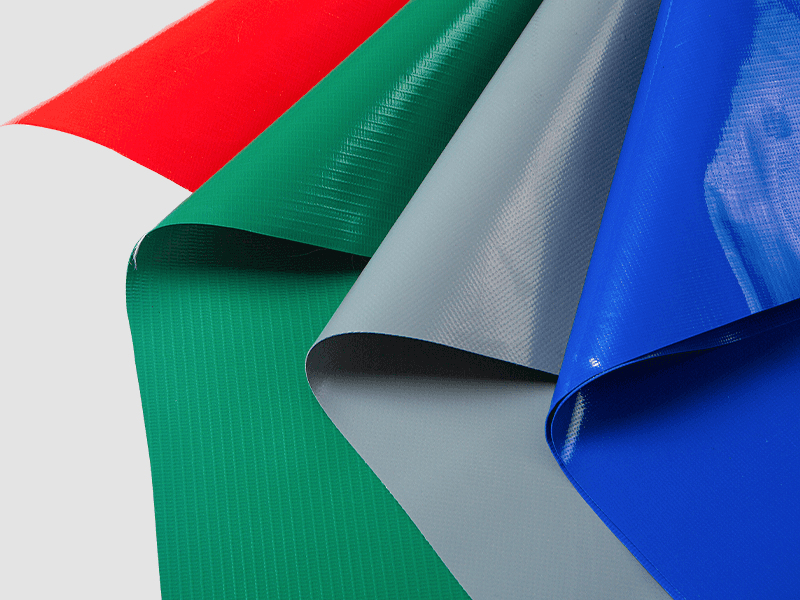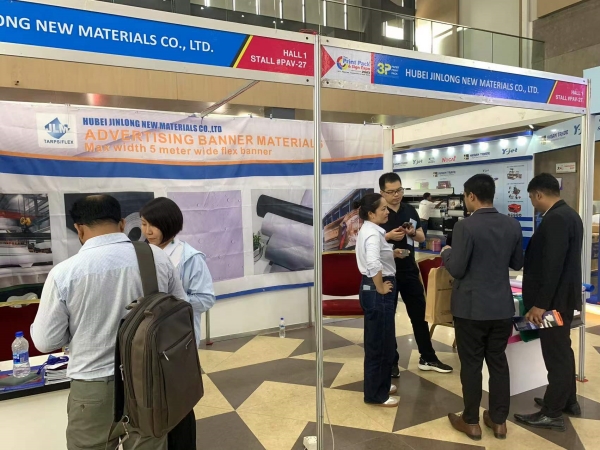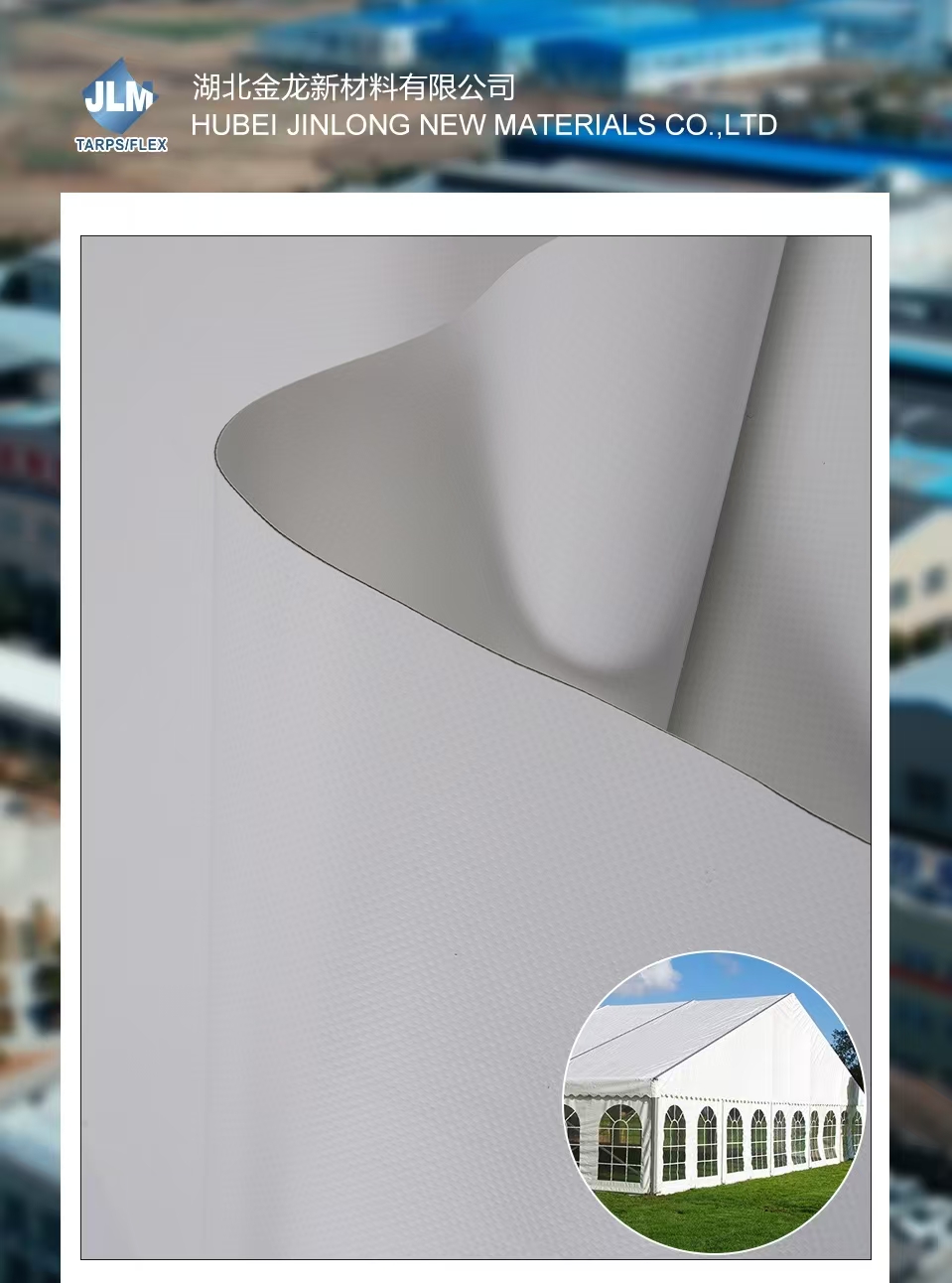Polyvinyl Chloride tarpaulin, commonly known as PVC tarpaulin, is a versatile, durable, and widely used material in various industries and daily applications. It is essentially a strong fabric coated with polyvinyl chloride, which enhances its strength, water resistance, and resistance to environmental factors. Over the years, PVC tarpaulin has become a preferred choice for covering, sheltering, transporting, and protecting goods, owing to its impressive mechanical properties and long lifespan.
Understanding PVC Tarpaulin
At its core, a tarpaulin is a large, flexible sheet of strong, water-resistant, or waterproof material. Traditional tarpaulins were made of canvas or cotton, but with the advancement of polymers, PVC tarpaulin became the dominant material due to its superior performance.
Structure of PVC tarpaulin:
- Base fabric – usually polyester, which provides strength and flexibility.
- PVC coating – applied on both sides to enhance water resistance, UV resistance, and durability.
- Surface treatment – sometimes added to improve resistance to dirt, mold, and chemical corrosion.
The combination of fabric reinforcement and PVC coating results in a material that is both tough and adaptable, suitable for industrial, commercial, and domestic use.
Key Properties of PVC Tarpaulin
PVC tarpaulin is popular because of its remarkable set of properties. These include:
- Waterproof and Weatherproof: It can withstand rain, humidity, and snow without absorbing moisture.
- UV Resistant: Treated tarpaulins can resist ultraviolet rays, preventing degradation when exposed to sunlight.
- Tear Resistant: The polyester base fabric makes it strong and resistant to tearing even under tension.
- Chemical Resistant: PVC coating offers protection against oil, grease, acids, and many other chemicals.
- Flame Retardant: Many PVC tarpaulins are designed to be fire-resistant for added safety.
- Durable and Long-Lasting: With proper care, PVC tarpaulin can last several years, even in demanding environments.
- Flexible Yet Strong: It maintains flexibility in cold weather while staying strong under heavy loads.
Applications of PVC Tarpaulin
Thanks to its durability and versatility, PVC tarpaulin has found applications in a wide range of industries:
-
Transportation and Logistics
- Truck covers and side curtains
- Cargo protection during shipping
- Temporary goods storage
-
Construction Industry
- Scaffolding covers and building wraps
- Roofing underlayment and temporary shelters
- Ground covers for dust and debris control
-
Agriculture
- Crop protection covers
- Greenhouse roofing and lining
- Silage and hay storage sheets
-
Outdoor and Recreational Uses
- Camping tents and ground mats
- Awnings, canopies, and shade structures
- Inflatable boats and water parks
-
Emergency and Relief Operations
- Temporary shelters for disaster relief
- Medical tents and field hospitals
- Quick-deployment protective coverings
-
Industrial Applications
- Machine and equipment covers
- Oil spill containment booms
- Industrial curtains and partitions
This broad spectrum of applications demonstrates why PVC tarpaulin is regarded as an essential material worldwide.
Benefits of PVC Tarpaulin
The advantages of PVC tarpaulin are numerous, and they extend beyond just durability and weather resistance. Let’s explore the key benefits:
1. Superior Durability
PVC tarpaulin is designed to withstand harsh conditions. Unlike cotton or polyethylene tarps, it resists cracking, tearing, and shrinking, making it a long-lasting investment.
2. Excellent Waterproofing
The PVC coating ensures complete water resistance, making it ideal for outdoor applications such as truck covers, tents, and awnings. Even in heavy rainfall, it prevents leakage and keeps goods dry.
3. UV Protection
For outdoor exposure, UV stabilization is critical. PVC tarpaulins block harmful UV rays, preventing premature material breakdown and protecting the contents underneath.
4. High Strength-to-Weight Ratio
Despite being lightweight, PVC tarpaulin is incredibly strong. This makes it easy to transport, install, and handle without sacrificing durability.
5. Customizable
PVC tarpaulins can be manufactured in different colors, thicknesses, and sizes. They can also be printed with logos, designs, or safety instructions, making them suitable for branding or commercial purposes.
6. Flame Retardancy
Safety is a priority in industrial and construction environments. Many PVC tarps are flame retardant, reducing the risk of fire-related accidents.
7. Resistance to Chemicals and Abrasion
Unlike many other fabrics, PVC tarpaulin does not degrade when exposed to oils, grease, or industrial chemicals, making it useful in demanding sectors like manufacturing and agriculture.
8. Cost-Effectiveness
Although PVC tarpaulin may cost more initially than simple polyethylene sheets, its longevity and multi-purpose functionality make it more economical in the long run.
9. Easy Maintenance
Cleaning PVC tarpaulin is simple. Dirt and stains can be wiped off easily, and the material resists mold and mildew growth, reducing maintenance efforts.
10. Eco-Friendly Options
With growing emphasis on sustainability, many manufacturers now produce recyclable PVC tarpaulins, which reduces environmental impact.
Comparison with Other Materials
It is useful to compare PVC tarpaulin with other common tarpaulin materials:
- Canvas Tarpaulin: Canvas is breathable but less waterproof and prone to mildew. PVC is more durable and fully waterproof.
- Polyethylene (PE) Tarpaulin: PE tarps are cheaper but thinner, less UV-resistant, and wear out quickly compared to PVC.
- Nylon Tarpaulin: Nylon is lightweight but lacks the heavy-duty strength and weather resistance of PVC.
From this comparison, it becomes clear that PVC tarpaulin balances durability, flexibility, and cost better than most alternatives.
Future Trends of PVC Tarpaulin
With increasing demand for protective materials and eco-friendly solutions, PVC tarpaulin is expected to evolve in the following ways:
- Recyclable Materials: More emphasis on recyclable and environmentally friendly PVC coatings.
- Smart Coatings: Development of self-cleaning and heat-reflective tarpaulins.
- Lightweight Innovations: Stronger but lighter fabrics for easier handling.
- Customization and Branding: Growing demand for customized tarpaulins with printed graphics for marketing purposes.
Conclusion
PVC tarpaulin is much more than just a protective sheet. It is a multifunctional material that combines strength, waterproofing, UV protection, and resistance to chemicals and fire, making it indispensable across industries such as transportation, construction, agriculture, and outdoor recreation. Its durability and cost-effectiveness ensure long-term value, while its adaptability makes it suitable for both industrial and personal use.
As technology continues to advance, PVC tarpaulin will remain a vital material, evolving into more eco-friendly and specialized versions to meet modern demands. Whether for protecting goods, providing shelter, or serving as part of industrial infrastructure, PVC tarpaulin proves to be a highly reliable and versatile solution.



 English
English русский
русский Français
Français Español
Español




















